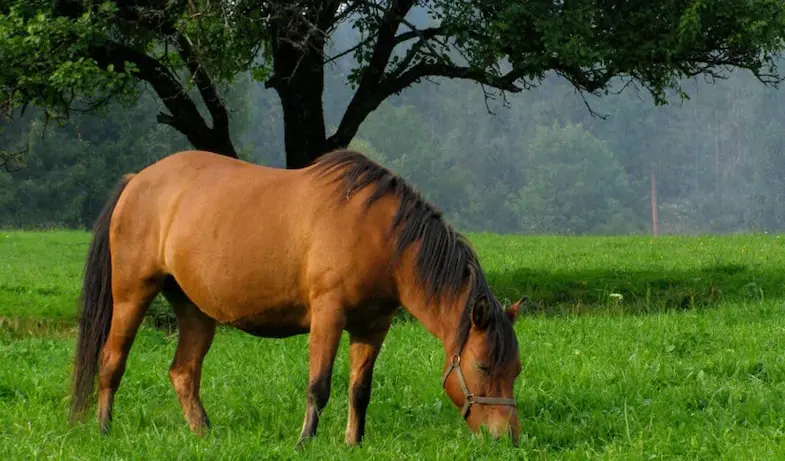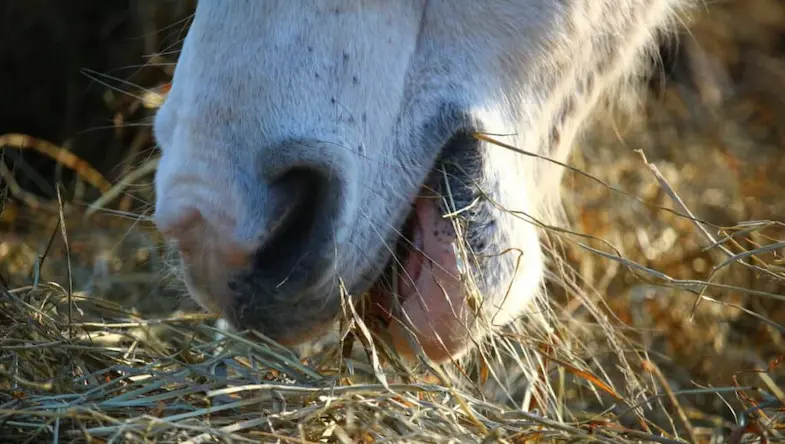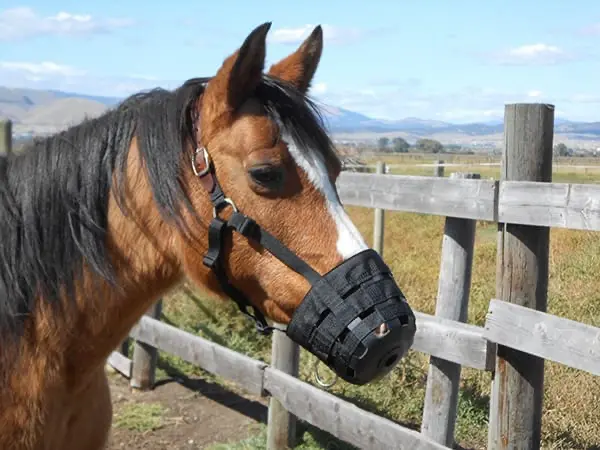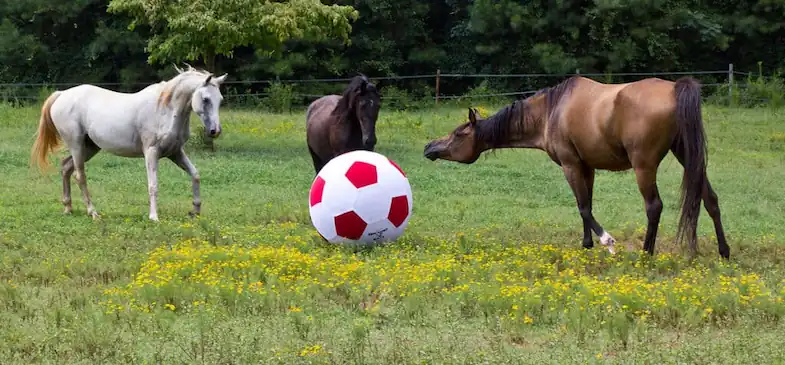Left to their own devices horses will, in the wild, naturally balance their weight throughout the year as food supplies change with the seasons. The problem is that we don’t leave domestic horses to their own devices and instead have a tendency to feed then higher calorie food, often without increasing their workload. This leads to a horse consuming more than they burn off which results in an excess of weight. Horses are also continual grazers so need our help to obtain (and maintain) a healthy weight.
Why do horses become overweight?
Just as some horses are prone to being hard keepers some are prone to being easy keepers which means that they have a tendency to be more overweight but on top of this obesity is becoming more common with all domestic animals and horses are no different. A more energy-rich diet combined with a less active lifestyle both play their part in this epidemic but the good news is that with some careful planning it can easily be stopped and even reversed.
Why does my horse need to lose weight?
Excess weight is never a good thing because the more a horse weighs the more he’ll have to carry around with him which will not only put extra strain on his body and muscles but it’ll also increase the stress placed on his heart and lungs. Your horse will be carrying more weight than his hooves and leg joints were designed to carry which can put them at greater risk of being afflicted with conditions such as laminitis. Being overweight will also make it harder for your horse’s body to deal with insulin, therefore increasing the chances of them suffering from insulin resistance conditions such as Equine Metabolic Syndrome.
How to help your horse lose weight
When it comes to horses it’s not as straightforward as putting them on a strict diet and exercise regime in order to get them to lose the weight. As we all know everything needs to be done slowly and cautiously.
The first thing you need to do is find out what your horse’s body condition score (or BCS), this will give you a number between 1 and 10 that you can use to determine just how much weight your horse needs to lose. An ideal score for a horse is between 4 and 5, anything over 7 is considered obese while anything under 3 is considered dangerously thin.
Once you’ve got your horse’s BSC you’ll then need to get his weight (this article will help you to do that) as well as his workload or state (or example, growing, light work, retired, etc). Together these will help you to work out your horse’s exact nutritional requirements and how much you should be feeding him.
Now that you know what your horse weighs, and how much he should be weighing you can start his weight loss program!
TIP: Everybody’s different but I find it really helpful to record a horse’s BCS and weight on a wall planner, this will help you to see how much weight they have (or haven’t lost) as well as make notes of what you changed and when.
Reduce your horse’s daily hay intake
As a rule of thumb, a healthy horse of normal weight should be eating around 2% of their body weight in hay every day but if your horse needs to lose weight then you should reduce the amount. To start with reduce your horse’s daily intake to 1.5% of his body weight and then weigh him again after a couple of months. If he hasn’t lost any weight then reduce it by a further 0.25% (so that he’s eating 1.25% a day) and then weigh him again after a couple of months.
You can gradually reduce your horse’s hay intake until he does start to lose weight but NEVER reduce it to less than 1% of his body weight. Doing so can cause a multitude of problems such as gastrointestinal complications as well as vices associated with boredom and stall rest such as weaving and cribbing.
Feed your horse the right sort of hay
You might think that hay is hay and that it’s all okay to feed to your horse but while there’s a lot of truth in this, some hays are better than others. Hay that has been harvested later will have a lower leaf-to-stem ratio which means that its nutritional value is lower and this is better for horses trying to lose weight. Ideally, you want to avoid feeding alfalfa, legumes, and grain hays to overweight horses, all of these have a much higher calorie content.
It’s also advisable to have your hay analyzed, doing so will tell you the number of water-soluble carbohydrates (or WSC) present in the hay. You want to reduce the number of carbohydrates your horse is eating so if your hay is high in WSC then you can soak it before feeding to your horse. You can soak it for up to 12 hours, although during the hotter summer months this should be reduced to no more than 6 hours.
Limit your horse’s access to pasture
A horse’s digestive system is designed to be slowly digesting food all of the time which is one of the reasons why they spend so much time grazing, the problem is though that grass can contain as much as 7.5% sugar and up to 50% WSC which is not going to help a horse that needs to lose weight, this is why you need to limit how much time your horse spends grazing.
This can be done in a number of different ways:
- Reduce turn out time – Horses can eat up to 5% of their weight in grass every day so limiting the amount of time they able to graze for will grateful help to reduce their weight. Ideally, your horse should be grazing for no more than 4 hours a day, although this doesn’t need to be in one go.
- Strip grazing – This involves you fencing off a small strip of pasture that will be moved daily (or less frequently during the colder months) so that your horse only has access to a small area of fresh grazing at any one time. This works because it limits the amount a horse can graze but it also means that the grass is always of good quality.
- Turn out at night – During the day when the sun is out grass will produce sugar but at night when there’s no sun the grass will use the sugar to grow which means that as the night goes on the sugar and WSC levels get lower until the morning when there’s virtually none left in the grass. This will vary during the seasons but there will always be considerably less sugar during the night.
- No rugs – Turning your horse out in colder weather without a rug (or a thinner one if the weather is very cold) will encourage them to move about more in order to keep warm. This will mean that they’re burning more calories so can eat more grass without it being a problem.
- Grazing muzzle – Horses are herd animals and can sometimes become stressed if they’re separated, if this is the case with your horse then a grazing muzzle may be the ideal solution. They reduce how much grass your horse can eat by up to 80% so are extremely effective. Many companies sell them but I prefer this one (available on Amazon) because its soft, flexible and fleece-lined.
Don’t feed your horse high calorie concentrates
If your horse is overweight then he doesn’t need any extra calories so you should ween him off of these. Instead, you should be feeding him food that still has the same nutritional value but just doesn’t have the same amount of calories. The same goes for high-fat supplements.
Ideally, you should be feeding your horse either pelleted vitamin and mineral supplements or balancers, both of these will give your horse everything he needs to stay healthy but without the weight increasing calories and fat.
Weigh everything your horse eats
We all get into the habit of weighing our horse’s feed based on the number of scoops but this will never give you an accurate idea of how much you’re feeding. Instead, get into the habit of weighing EVERYTHING you feed your horse. A simple set of kitchen scales with a big bowl (such as this one I found on Amazon) is all you need, but it will help you to know exactly how much you’re feeding.
Don’t starve your horse
You might think that if you drastically reduce the amount of food your horse consumes then he’ll lose the weight but this isn’t the case, feeding too little will actually have the opposite effect because your horse’s body will hold onto the fat it has instead of burning it. On top of that not feeding your horse enough will also result in further complications such as ulcers, colic, and other digestive problems. Rather than doing this, it’s better to feed your horse a little bit every few hours.
Increase your horse’s exercise
We all know that you can’t lose weight with diet alone and horses are no different so you need to factor exercise into your horse’s weight loss plan too. Always start off slowly and increase your horse’s workload gradually, don’t expect too much and don’t overdo things, if you’re horse isn’t normally ridden don’t think that within a month you should be able to run the Kentucky Derby in record time.
Pole work is except for helping your horse’s balance, concentration and flexibility but it can also be good for weight loss too because your toning your horse’s muscles and working his whole body, this recent article on strengthening your horse’s back will help with some exercises. If your horse can’t be ridden you can still exercise him either with a lunge line, a horse walker, or simply by leading him, anything to get him moving.
You may even be able to use some horse toys to encourage him to move, things such as a horse football or Jolly Ball will help.
Change your horse’s bedding
It might sound silly to suggest that your horse’s bedding is playing a role in his weight but if you’re reducing the amount of food he’s getting this could well be the case. Some horses will eat their straw bedding anyway but a recent study showed that horses on a calorie control diet started to eat their wood shavings. It’s not clear if they were doing that because they were still hungry or because they were bored due to not eating as often but either way it’s not going to help your horse lose weight, nor is it going to do his digestive system any favors.
If your horse is eating his bedding, or if you’re worried that he might start doing so then it’s a good idea to change what you’re using. These days there’s a vast range of alternatives to straw and wood shavings but if you’re not sure what to use then this article will help.
Make your horse’s water fun
It’s always important to make sure your horse has plenty of fresh water but you can encourage him to spend more time with his water (and therefore less time eating) by adding a few apples to the water. I know that you’re trying to stop your horse eating so much but the effort he spends trying to get the apples is greater than the amount of energy he’ll get from the apple itself.
Further reading
- Calculating your horse’s weight
- Feeding a horse with no pasture
- Keeping a horse a home
- Healthy treats for horses
- Is my horse healthy?
- Treating ulcers
- Where should I keep my horse?
- Caring for older horses
- Do horses need supplements?
- Preventing boredom
I hope you found this article helpful. If you did I’d be grateful if you could share it please as it would really help me.
Recommended products
Over the years I have tried hundreds of different horsey products, from various blankets and halters to different treats. Some I’ve loved, others I’ve hated but I thought I’d share with you my top all-time favorite products, the ones I never leave the yard without. I’ve included links to the products (which are in no particular order) that I really think are great.
- Horse Knots by Reference Ready – If you’re like me and enjoy pocket reference guides then you’ll love this knot tying guide. These handy cards can easily fit in your pocket or attach to the saddle for quick reference. They’re waterproof, durable and are color coded to make them easy to follow.
- Mane ’n Tail Detangler – Even if you never show your horse you’ll need to detangle his tail from time to time (and possibly his mane too) which is always a challenging chore! I’ve found that if I run a little bit of detangler through my horse’s tails every few days it stops them from getting matted up and makes combing them easy, even if they’re coated in mud. I don’t know if I should admit to this or not but it also works wonders on my hair.
- TAKEKIT Pro clippers – Over the years I’ve tried a lot of different clippers and while some were obviously better than others I found these to be by far the best. They are heavier than a lot of other clippers but for me, that’s a good thing, it makes them feel more sturdy and hardwearing. On top of that they have a range of speeds so are just as good for clipping your horse’s back as they are his face. I also like the fact that they come in a handy carry case but that’s not for everybody. The company that makes them is super good and incredibly helpful too, a real bonus these days. The only thing I wasn’t keen on was the fact that it doesn’t come with any oil, but that’s not a major problem as it’s not difficult to buy lubricant.
- Shire’s ball feeder – There are so many boredom buster toys out there but I like to use these every day, regardless of whether or not my horses are bored. I find that it helps to encourage my horses to problem solve by rewarding them with treats (or pieces of fruit) but it also mimics their natural grazing behavior which helps to keep them calm and de-stressed.
- Horse safe mirror – This is a strange one that many people are surprised about but I like to put horse safe mirrors in the trailers as well as in the quarantine stalls. It helps to prevent the feeling of isolation by giving the impression of other horses being around. Being herd animals horses can get extremely stressed when they feel that they’re on their own but with these stick-on mirrors, they believe that at least one other horse is with them.
- Rectal thermometer – I know this isn’t glamourous at all but it’s vital for your horse’s well-being to be able to check their temperature and a rectal thermometer is the easiest way of doing this which is why I’ve added it to the list.
Shopping lists
I’ve also put together a few shopping lists of essential items that I’ve found helpful over the years. I’ve broken the lists down into different categories rather than put everything in one massive list 😉





